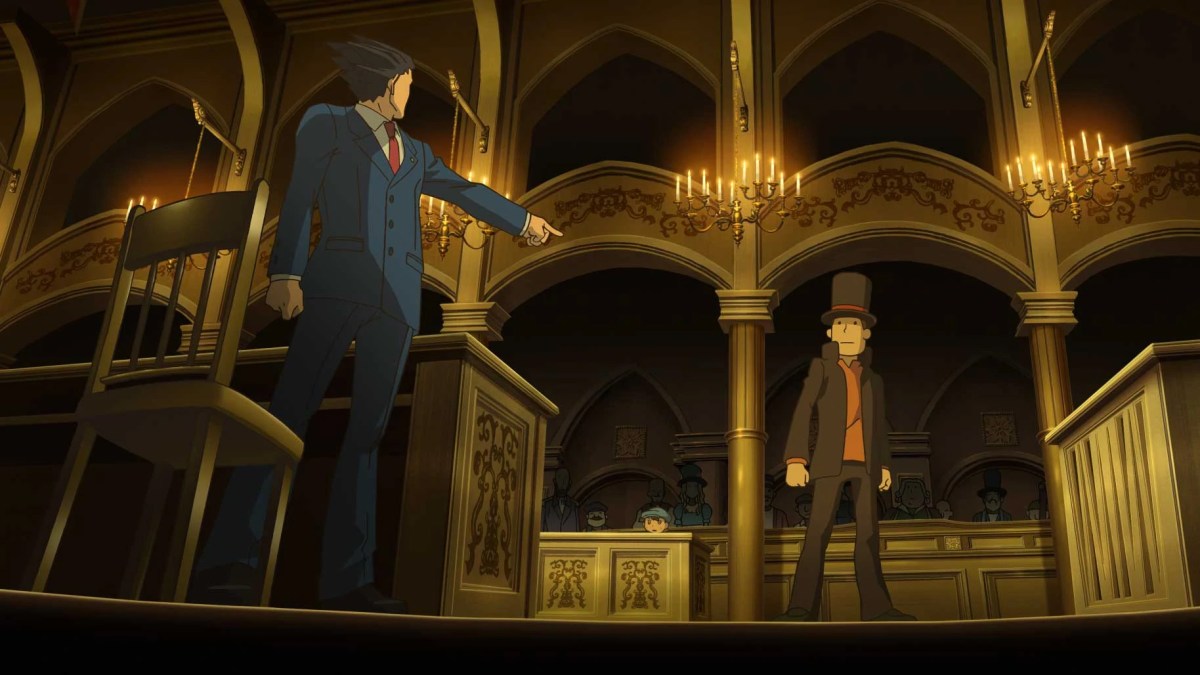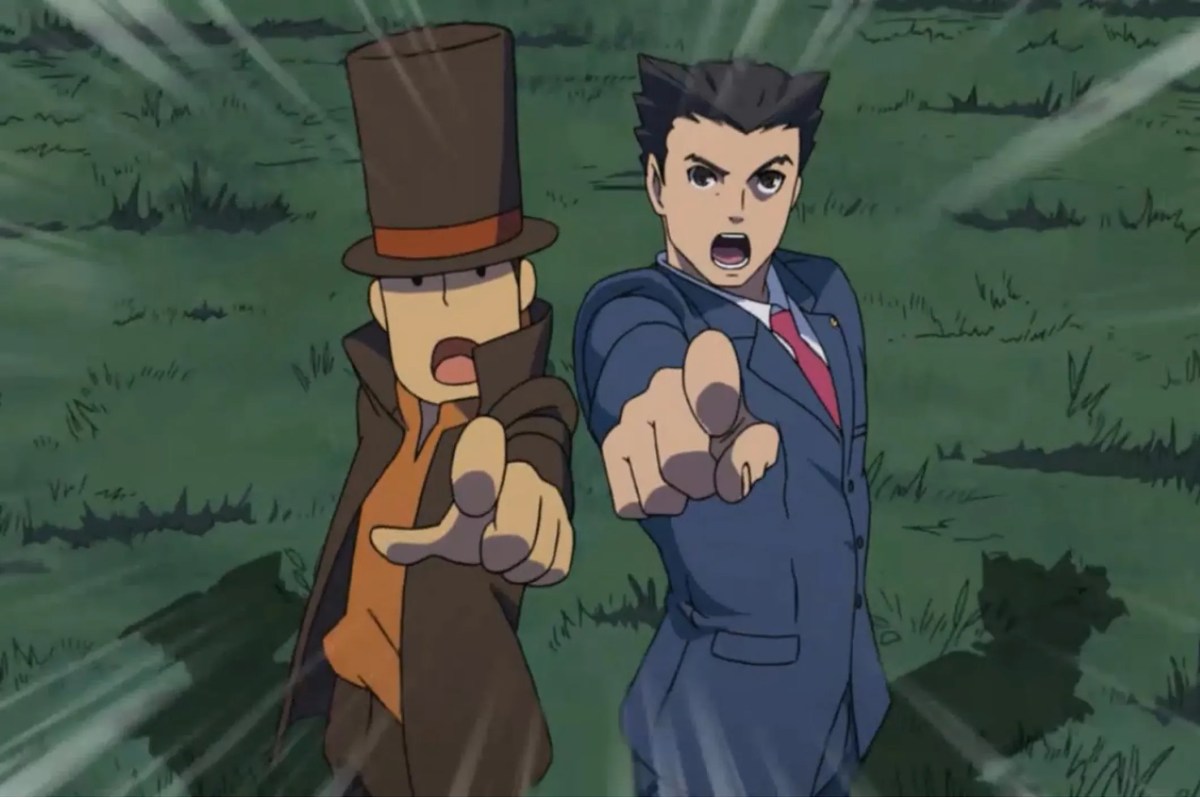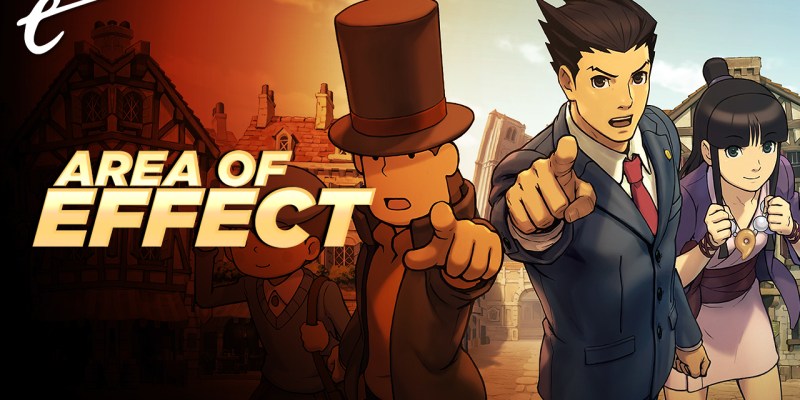This article contains spoilers for the Ace Attorney and Professor Layton games, as well as their 3DS crossover, Professor Layton vs. Phoenix Wright: Ace Attorney.
As revealed at the last Nintendo Direct, we’re getting a new Professor Layton game, Professor Layton and the World of Steam. I couldn’t be happier with the news — not because I’m looking forward to playing it (though I definitely am) but because it brings the possibility of a Professor Layton vs. Phoenix Wright: Ace Attorney 2 that bit closer.
If you’ve not played the original Professor Layton vs. Phoenix Wright, you’ve missed out on one of the wonderfully ridiculous games of all time. It’s a crying shame that, thanks to the Nintendo 3DS eShop closing at the end of March, the game will only be available on cartridge. Still, there’s always eBay, right? Not when the game is selling for $149.99.
Both the Ace Attorney and Professor Layton games are silly in their own right. Yes, Japa— er, America’s overhauled justice system means that trials have to be completed in three days. But forcing defense attorney Phoenix Wright to prove who actually committed a crime is stretching credulity. Not to mention that time he had to defend an orca whale.
Then there’s Professor Layton who, along with Luke, traveled 10 years into the future. Only he didn’t — it was a massive replica London, constructed to fool some scientists into making an actual time machine. I absolutely swear I’m not making this up.
Professor Layton vs. Phoenix Wright: Ace Attorney took the daftness of both franchises and squared it. Yes, you can roll your eyes at Professor Layton’s underground city, but it’s still within the realm of Bond villainy. Layton versus Wright, on the other hand, was something else entirely.

The premise was that both Layton and Wright ended up in a medieval town known as Labyrinthia, where magic was real and people weren’t particularly fond of witches. So, while you’d have Layton roaming the town looking for clues and solving puzzles, Wright was using his legal skills to stop people from being burned at the stake. As you do.
But this particular rabbit hole went so, so much deeper. This world’s magic meant you could create portals on green surfaces, provided you had the incantation and gem. Except the reason a gem and an incantation was needed was because magic wasn’t real, and this allowed it to be staged.
And the people? They’d volunteered to have their memories wiped, but there was something in the water so that when you rang a bell people fell asleep. That also led to a big fire that traumatized a chemical company CEO’s daughter, so he created all the medieval schtick as therapy and…
Does it sound like I’m talking absolute nonsense? That’s because I am. When the credits rolled on Professor Layton vs. Phoenix Wright: Ace Attorney, when you had time to think, it became apparent just how utterly daft it all was.
The spell that created a portal on green-colored walls, for example? If magic was fiction, then how could someone actually reach through the wall? Did someone turn up, there and then, to hypnotize them into thinking it had worked? Did they get Penn and Teller involved? Why did they even have to prove it had been used? And yet, while I was playing Layton vs. Wright, I was absolutely swept up in the madness.

Because that’s Layton vs. Wright’s biggest accomplishment, more so than bringing those two legends together. It told a story that was patently ridiculous and yet kept you absolutely hooked. It maintained such a sense of speed that you were too busy tackling the next problem to call the story into question.
So when you discovered what the witch burnings really were, you were too busy to realize that revelation undermined half of the “trials” that had taken place. Logically, discovering magic was a fiction meant that my court-conquering defense arguments didn’t make a lick of sense. But instead of mumbling, “Hey, wait a minute…” and setting down my 3DS, I was too distracted by the energy and the sheer entertainment factor of it all.
The game’s rousing soundtrack played a significant part, but it was the sheer pace of the game and, in particular, the courtroom sections that helped pull off the illusion. I tip my hat to developers Level-5 and Capcom — I can barely comprehend the kind of convoluted planning that must have been involved in crafting the game.

Layton vs. Wright was a masterstroke of momentum and misdirection that gave you an immediate problem to solve. “Turnabout” comes up often in the Ace Attorney series, the idea that Phoenix’s fortunes can turn on a dime. Layton vs. Wright turned things up to 11, almost blinding you to the house of cards the game was building. Think BioShock’s big twist was, er, shocking? This game threw out those kinds of revelations every five minutes.
It’s that kind of experience that Professor Layton vs. Phoenix Wright: Ace Attorney 2 could deliver with maybe a little more Miles Edgeworth thrown into the mix. Let Nintendo Switch owners experience the kind of absurdity that only the combined forces of Professor Layton and Phoenix Wright can offer.
So, when the credits roll, I’ll sit there, astonished by how expertly I’ve been fooled, too transfixed by every contrivance to notice the whole story was built on sand. And maybe, just maybe, a matchstick puzzle or two.
